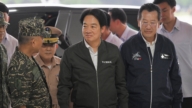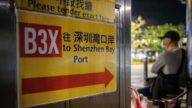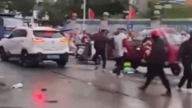【新唐人2012年8月20日讯】在香港市民登上钓鱼岛,被日本当局逮捕遣返之后,中国多个城市发生规模不一的游行示威。警方在场维持秩序,没有进行阻拦。中共在钓鱼岛主权问题上雷声大雨点小,虽然平日有时候派出船只在钓鱼岛附近巡逻,但是香港市民登岛以及被抓捕的时候,中共并没有派出船只进行保护。学者指出,中共内心虚弱,但是借用“民族主义”转移国内重重矛盾。
8月19号,广州、深圳、安阳、南京、南宁、成都以及杭州等中国多个城市都出现了游行示威,反对日本侵占钓鱼岛。
周日上午在广州,大批民众在日本总领事馆外,拿着国旗及写上“誓死捍卫中国领土钓鱼岛”等标语的横幅,呼喊抗议口号和静坐,随后游行抗议。大批公安与武警车在附近戒备,公安更为游行人士开路,但也有多名穿着迷彩服装的人员手持摄录器材拍摄。
示威活动提前在中午结束,发起人宣布约900人参加,并透露,计划向政府申请在广州设立保钓组织分会,筹组珠江三角洲的渔民,一起出海到钓鱼岛宣示主权。
广州画家何国泉表示,反日游行表面上看好像是自发的,事实上底下是有组织的。甚至有些是默许的。中共是在利用“民族主义”转移国内矛盾。
广州画家何国泉:“在中国来讲,你游行示威这都是非法的,游行都不允许的。但是就这东西还是允许的,警察也可以来开道的。警察站在旁边不怎么管的。中国有些一帮人在一起念念诗,只要人多了,他都来干预的。他这个反日大游行上街是很反常的事情。那就是转移目标嘛。国内的事情多了。维权的这些事情。”
首都北京没有出现大规模反日示威活动,只有零星的民众自发到日本驻华大使馆外示威。
《长城抗战网》主编贾元良认为,民众反日游行还是有意义的。
《长城抗战网》主编贾元良:“第一表示爱国的热情;第二也是对日本施压的方式;第三,也是给政府看。民众都有这个情绪来表达了,你政府不作出积极表达,还是口头的方式,对政府来说也是脸上无光的事情。”
《中国洞察事务监督网》主编光远认为,中共当局内心虚弱,并不敢对钓鱼岛主权采取实质行动。
《中国洞察事务监督网》主编光远:“我觉得会大事化小,小事化了,不了了之。我个人感觉,这是我们善良的人的一种愿望,武力夺回来。但是我想不可能的。中共现在一切都是维稳。(但是)不是说你政府想稳定就稳定了。”
深圳的反日游行队伍就比较激烈,一辆日本牌子的警车稍早时在路边被推翻,部分民众爬上警车用铁棍敲打车身。当局增派警力维持秩序,并出动直升机监视情况,戴上头盔与手持盾牌的武警赶到现场戒备。下午1点多突然天降大雨,有示威者质疑是直升机投下水弹。目击者表示,群众四散避雨时,被近百名武警包围,有人遭公安勒脖子。
时事评论员林和立分析,北京开始担心民族主义这把“双刃剑”会反伤中共,如果大陆保钓人士将矛头倒过来,指向姿态软弱的中央政府,而效法沿海城市的保钓人士,甚至出现雪球效应,令事情越演越烈。所以,北京当局只好“虎头蛇尾”,低调解决事件。
一些学者及政界人士指出,北京及特区政府对这次保钓行动的态度,由最初默许甚至高调宣传,后来却以大事化小方式低调解决,相信令不少港人看清,中共利用民族主义包装独裁政权的本质,对港人来说是最好的国民教育。
采访编辑/秦雪 后制/葛雷
Beijing Regime Utilizes Anti-Japan Demonstrations
Arrested Hong Kong citizens have been deported by
Japan after landing on the Diaoyu Islands (Uotsuri Jima).
After the incident, several demonstrations
erupted in several Chinese cities.
The protests were not stopped by the on-site police force.
In reality, the Chinese Communist Party (CCP)
has said a lot, but done very little about the issue.
Although it has ships patrolling near the Diaoyu Islands,
the regime did not protect the arrested Hong Kong citizens.
Scholars say that this issue
has exposed the CCP’s weaknesses.
The regime has actually utilized “nationalism" to transfer
public attention from the intense domestic conflicts it faces.
On August 19, demonstrations against Japanese occupation
of the Diaoyu Islands arose in a number of cities in China.
This included Guangzhou, Shenzhen, Anyang,
Nanjing, Nanning, Chengdu and Hangzhou.
In Guangzhou, outside the Japanese Consulate General,
the demonstrating masses held CCP flags and banners.
They chanted slogans, and staged sit-ins and marches.
Lots of police vehicles were alerted nearby.
Public security cleared a route for the parade.
Meanwhile, many people in camouflage
clothing were videotaping the scene.
Protests ended at noon, which was earlier than scheduled.
Organizers revealed approximately 900 people participated.
They applied to the authorities to set up Guangzhou
branch of an Association for Protecting the Diaoyu Islands.
According to organizers, fishermen in the Pearl River Delta
will proclaim sovereignty over on the Diaoyu Islands.
He Guoquan, a Guangzhou-based painter, has revealed
that anti-Japanese demonstrations seemed spontaneous.
In fact, the demonstrations were
officially organized and condoned.
The CCP was using the public’s “nationalism"
to transfer focus from internal contradictions.
He Guoquan: “The authorities ban mass protests in China.
But now they allowed such demonstrations and
the police even cleared the route for the march.
In China, police intervene in peoples group activities,
even if they have gathered to read poetry.
So the anti-Japanese parades were very unusual.
That actually helped the authorities to divert public
attention away from domestic issues like defending rights.”
No similar protest have occurred in Beijing, and people
only sporadically protested outside the Japanese Embassy.
Jiayuan Liang, Chief Editor of ‘cckz1933.cn’ website,
commented that anti-Japanese demonstrations make sense.
Jiayuan Liang: “Firstly, it showed patriotic
enthusiasm. Secondly, it pressured Japan.
Thirdly, it pressured the government.
Even the people have stood up to express their feelings,
but the government is still inactive, only talking.
That is a dishonorable thing for the government itself."
Guang Yuan, Chief Editor of Dongcha.com, stated
that the CCP authorities do not dare to take real action to claim sovereignty over the Diaoyu Islands.
This is due to the CCP’s inner weakness.
Guang Yuan: “I believe the issue
will be minimized as much as possible.
We want to get back the territory by using force,
but that would be impossible, I guess.
Now the CCP does everything to maintain stability.
However, the stability isn’t relying on the wish of the regime”.
The anti-Japan demonstrations in Shenzhen were intense.
A Japanese brand of police car was overturned.
Some people climbed onto it, beating it with iron bars.
Local authorities dispatched police
and helicopters to monitor the situation.
Around 1pm, there was a sudden rain downpour.
Some protesters questioned whether
it was helicopter-dropped water bombs.
Witnesses said when the masses dispersed to take shelter
from rain, hundreds of armed police besieged them.
Some people were even strangled by the police.
Political commentator Willy Lam said that the
Beijing regime began to fear that the “double-edged sword" of nationalism may end up hurting the CCP itself.
The regime worries that activists for the Diaoyu islands
might turn this spearhead against the weak CCP regime.
A snowball effect might even be caused
in China, which will intensify the issue.
Therefore, the CCP authorities had to end
the issue quickly, and in a low-key manner.
Some scholars and politicians commented
on the authorities’ attitude taken toward the protest.
The Beijing regime and special district governments
began to condone and propagate a high profile for the protests, but downplayed the action in the end.
The way it has been handed has made the Hong Kong
people understand the CCP’s authoritarian nature.
This nature is packaged with nationalism.
It was the best education on this nature
for Hong Kong people, commentators have said.























